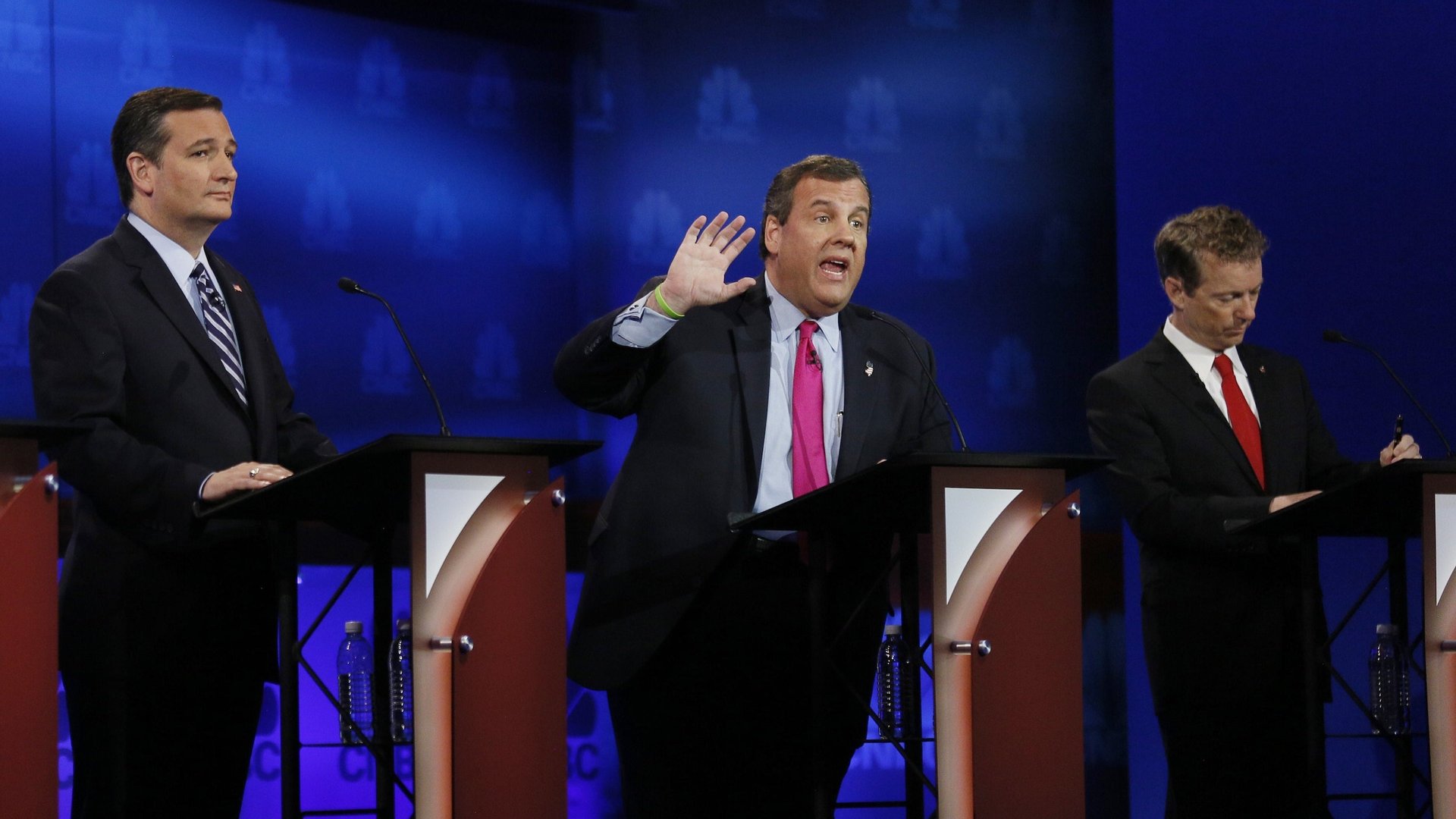Republicans would rather complain about the media than seriously discuss the national debt
The third Republican presidential debate hosted and moderated by CNBC was what you might have expected. The issues throughout the two-hour exchange focused predominately on the health of the economy, taxes, entitlement programs, and the massive $18 trillion national debt—all of which the CNBC network was created to exclusively cover for a national television audience.


The third Republican presidential debate hosted and moderated by CNBC was what you might have expected. The issues throughout the two-hour exchange focused predominately on the health of the economy, taxes, entitlement programs, and the massive $18 trillion national debt—all of which the CNBC network was created to exclusively cover for a national television audience.
Compared to the two previous debates hosted by Fox News and CNN, the GOP candidates were quick to lash out at the moderators rather than each other. At one point, New Jersey governor Chris Christie appeared visibly irritated when a question about fantasy football and gambling was posed to the participants. (“Enough on fantasy football. Let people play! Who cares.”) Florida senator Marco Rubio blasted the media as puppets for the Democratic party—“the Democrats … have the ultimate super PAC, it’s called the mainstream media.” And Republican National Committee chairman Reince Priebus stormed into the spin-room expressing his disappointment on how unprofessional the CNBC moderators were.
Whether or not you happen to be a registered Republican, Democrat, or independent, it’s hard to disagree with Priebus. It’s not just because the CNBC moderators cut off the candidates while they were speaking or refused to let others answer a question. Priebus is right because the CNBC hosts failed to even touch on the biggest story in Washington over the past week: the creation of a bipartisan, two-year budget agreement.
For the average American, budget matters can be an incredibly boring and migraine-inducing subject. Yet for regular CNBC watchers, reporters covering Capitol Hill, and the millions of federal employees who receive a paycheck from the government every week, the war over discretionary spending is at the crux of the matter.
Bipartisan deals don’t often get done in a hyper-partisan environment. The last four years is an apt reminder of how catastrophic and stress-inducing budget wars can be: In 2011, the United States flirted with what would have been a devastating debt default. The country continues to grapple with the national debt, something that the sequester cuts were designed to address. And just last month, Americans almost experienced their second government shutdown in three years.
So when Republican leadership and president Barack Obama do finally reach an understanding on the budget, it’s a big deal. This is precisely what occurred on Oct. 26, when both parties managed to cobble together a deal that would lift the sequester caps by an additional $80 billion dollars over two fiscal years, spread evenly between defense and non-defense discretionary accounts. Yet the GOP debate—and the moderators guiding the discussion—barely mentioned the issue.
To be perfectly fair, the Republicans running for president of the United States deserve a lot of the blame as well. With the exception of Kentucky senator Rand Paul, who delved into the spending deal and the reasons why he’s preparing to filibuster the legislation when it goes to the Senate floor, the candidates stayed away from budget matters as if Washington hasn’t been undergoing a war over fiscal policy since president Obama came into office nearly seven years ago.
Texas Senator Ted Cruz found the time to release a statement from his Senate office calling the bipartisan budget deal another victory for “the Washington Cartel,” but spent barely a minute on the new plan during the debate. When he did, the budget discussion was dumbed down to political rhetoric about the Republican leadership being complicit with president Obama in increasing the debt and approving tens of billions of additional dollars that the government doesn’t have.
Sprinkle in a few lines from Christie, former Florida governor Jeb Bush, and Ohio governor John Kasich, and you maybe have several more minutes about the budget formula that the House of Representatives passed on the same day as the debate. In other words, during a two-hour debate about taxes, spending, entitlements, and the economy, the biggest federal budget deal since 2013 was diminished to a fifth or sixth-tier issue.
Before the third GOP debate began, Politico reporter Burgess Everett asked lawmakers what they expected from the prime-time event. Would the budget compromise be a popular target for everyone on the stage? Republican Texas senator John Cornyn replied ““Oh … like a piñata.” There was an expectation that Republicans who made the deal, like former speaker John Boehner and Senate majority leader Mitch McConnell, would be two punching bags for a GOP primary electorate that is full of dedicated fiscal conservatives.
Luckily, Boehner, McConnell, and Paul Ryan, Boehner’s ultimate replacement as Speaker of the House can rest assured: GOP presidential aspirants pose no threat. They would rather get easy applause lines by shooting arrows at the media instead of delving into serious questions about the nation’s budget.
We welcome your comments at [email protected].